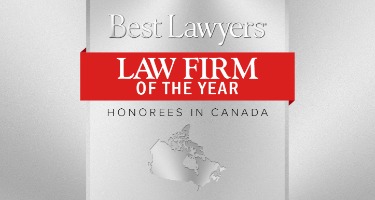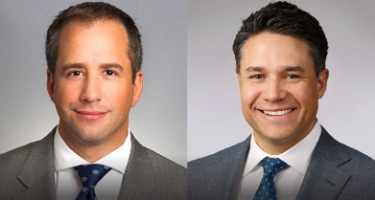The delicate pas-de-deux between labour and capital is a permanent feature of any developed economy—and helping Canadian employers master the complicated footwork, both professional and political, is Harris & Company, a Vancouver-based boutique practice that was recently named Canada’s “Law Firm of the Year” for Labour and Employment Law. Harris managing partner Colin G.M. Gibson sat down with Best Lawyers CEO Phillip Greer to discuss workplace safety, the inexorable growth of paid leave, and why union picketers must not protest any louder than the volume of a household Hoover.
What does it mean to Harris & Company to be named Canada’s top Law Firm for Labour and Employment Law?
Colin G.M. Gibson: It’s flattering, of course, but also gratifying because it recognizes the outstanding work our lawyers and staff do every day. Harris & Company was formed in 1992, when our founding partners split off from a full-service firm and formed a labour-and-employment boutique. We now have 49 lawyers. Our practice spans not only the traditional areas of labour, employment, and human rights law; we also have groups that specialize in workers’ compensation, freedom of information and privacy, occupational health and safety, education law, and so on. So we’re most grateful for this award, as it verifies the success of these efforts.
Which specific cases in the last year do you think helped contribute to this distinction?
There are many. This is a big collective-bargaining year in British Columbia, both in the public sector and in various areas of the private sector. We’ve been providing services to many employers involved in bargaining, some of whom face labour disputes. Examples include the recent strikes at Vancouver’s big hotels—our lawyers were at the Labour Relations Board literally every day on one type of application or another. We also went to the BC Supreme Court and obtained an unprecedented injunction that required the picketers at the hotels, who had been banging drums and shouting into megaphones, to keep their noise under a designated decibel level, equivalent to the sound of an average vacuum cleaner. They couldn’t be louder than that.
We also provided advice regarding the bus strike in Vancouver. We’re supporting the bargaining at the University of Victoria and British Columbia Institute of Technology. For years we’ve been strategic advisers to the provincial government; we do that regardless of which political party is in power. One area that has attracted significant attention is cannabis in the workplace. Brad Cocke, one of our partners, is the leading lawyer in British Columbia on cannabis issues, and he’s constantly working with employers to refine their practices and navigate those issues in their workplaces.
What are some important labour-law trends you’ve noticed of late?
The Labour Relations Code was recently amended in British Columbia. The amendments did not eliminate the secret-ballot vote on new certification applications, as some employers had feared they would. That means we have not returned to card-check certification in BC. Labour arbitration practice continues to be very busy. There is a great deal of activity in that area and in the human rights area.
Occupational health and safety are very busy. Unfortunately, there have been fatalities in the province—workplace fatalities that the members of our Occupational Health and Safety group have been involved in helping employers with. Bullying and harassment in the workplace also continue to be a significant issue. The British Columbia government is currently looking at amendments to the Workers’ Compensation Act. We’re advising the British Columbia Employers’ Forum, which is very concerned about the proposed amendments to the Act because they feel the playing field is tilted against employers. The employers not long ago walked out of the process and said they weren’t going to participate. We spend a lot of time advising employers on handling employees with disabilities. That’s escalating, especially in the areas of mental health and addiction.
Are issues such as the minimum wage, employment insurance for seasonal workers, diversity requirements, or foreign-worker visas drawing the attention of your clients?
Raising the minimum wage is certainly a concern for small and medium-sized employers. Probably of more significance for those employers in BC is the elimination of Medical Services Premiums and the implementation of a payroll-tax. In many small and medium-sized workplaces, employees paid their own MSP premiums, and so now with the payroll tax, the entire burden of that system is shifted to the employers. This creates a significant increase to the cost base for these businesses. Add to that the recent amendments to the Employment Standards Act, which include substantial increases in job-protected leaves—things like an increase to 18 months of maternity and parental leave, longer compassionate-care leave, and a series of new leaves, such as leave for the disappearance of a child, for the death of a child, for domestic and sexual violence, new critical-illness and injury-leave provisions. While, of course, it’s laudable to provide this kind of support for employees, it does place a huge burden on small and medium-sized employers that have difficulty finding temporary replacements for employees who are off on these job-protected leaves.
You mentioned the Employment Standards Act. How are you helping your clients comply with its provisions?
The Employment Standards Act provides the minimum employment standards in BC, and it recently went through a number of amendments. Many smaller employers, and in some cases even medium-sized employers, don’t really understand all their obligations under the Act, so we provide training sessions that help employers ensure they are in compliance. There’s also a useful guide that the BC government publishes online. We encourage our clients to understand key areas such as: What does job protection mean? What are the rules regarding hours of work and overtime? How do you create an enforceable averaging agreement? In that area, for employers that use averaging agreements, we provide templates and paint-by-number guides for completing them.
Are there any upcoming projects you’re particularly excited about?
In late 2014 we launched a commercial-litigation practice in our firm. Some of the lawyers who joined us in December 2014 from the former firm Taylor Jordan Chafetz were commercial litigators. We’ve expanded our litigation group since that time. Very recently, we brought over Hein Poulus, QC, Jonathan Buysen, and Kasey Campbell from one of the full-service firms in Vancouver. Hein and that team are all commercial litigators. Our goal is that, parallel to our workplace-law practice, we also want to be known for our leadership in commercial litigation. We’re also continuing to execute on our firm’s strategic plan and striving to be the best in our chosen practice areas. So we’re very excited about that.
This interview has been edited for length and clarity. At the time of the interview that took place in the fall, Colin G.M. Gibson was the managing partner. Lindsie Thomson started her term as the current managing partner in January 2020.































